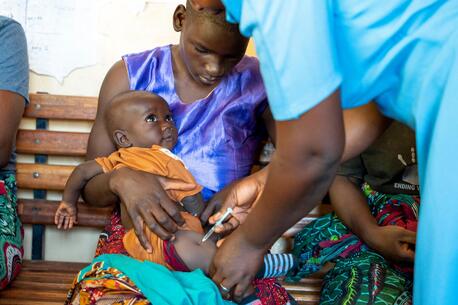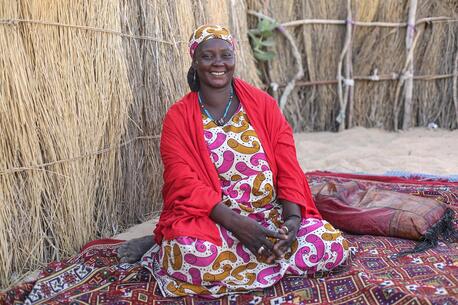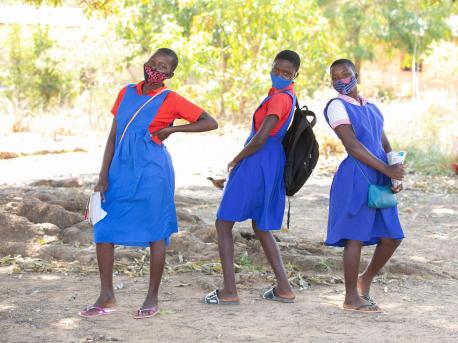
Desks Save the Day: Learning During COVID-19 in Malawi
Desks provided by the Kids In Need of Desks (K.I.N.D.) project — a partnership launched by MSNBC's Lawrence O'Donnell and UNICEF in 2010 — improve students' study skills and help them maintain physical distancing in class.
Luwambaza Primary School is tucked away in the deep forest of rubber trees in Nkhatabay district, in northern Malawi. At first glance, it seems like an ideal environment for learning. But before last November, there was a worrying trend of absenteeism among the students.
The school’s deputy head teacher, Steven Hembe Munthali, has spent six of his seven-year teaching career at the school. He remembers how difficult it was for the students, seated on the ground, to get comfortable and focus on their studies. "The situation was hopelessly bad," he recalls.
Before the desks arrived, students sat on the floor, hunched over their schoolwork
“Both teaching and learning were difficult. For one, the awkward posture as a result of sitting on the floor hugely affected the handwriting of all learners,” recalls Munthali.
Approximately 65 percent of students in Malawi do not have a desk or chair, making it extremely hard for them to concentrate on daily lessons.
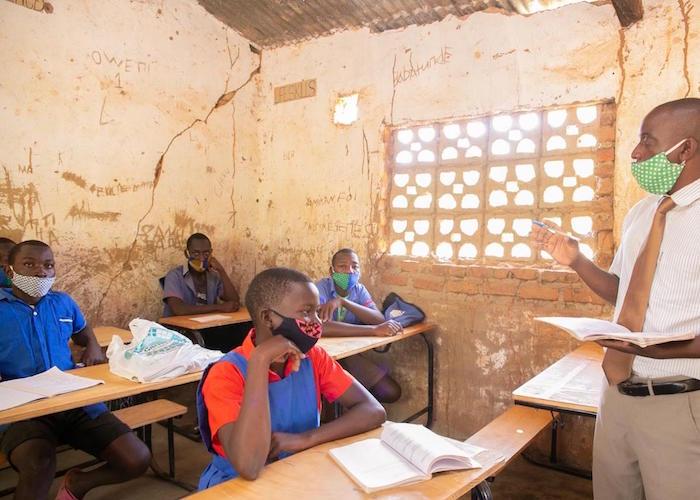
At Lumwambaza Primary School in Nkhatabay district, northern Malawi, Deputy Head Teacher Steven Hembe Munthali (far right) says his students' work improved after their classroom was furnished with desks from the Kids In Need of Desks (K.I.N.D) project, a partnership between MSNBC's Lawrence O'Donnell and UNICEF.© UNICEF/UNI386389/
All this changed in November 2019, the moment learners started using proper desks. There was a swift turnaround, Munthali says, as learners’ handwriting became more legible. At last, teachers were able to understand what the students were trying to convey in the practice exercises. "Everyday attendance has also improved as the desks have helped to increase their enthusiasm," he reports.
Since 2010, the K.I.N.D. Fund has provided more than 235K desks benefitting more than 938K learners in Malawi
The school received the desks as part of a project called Kids In Need of Desks (K.I.N.D.), a partnership between MSNBC's Lawrence O'Donnell and UNICEF USA. K.I.N.D. has provided desks for primary schools throughout Malawi since 2010.
MSNBC’s Lawrence O’Donnell created the groundbreaking K.I.N.D. Fund with UNICEF in 2010 to support education in Malawi. Since then, the program has raised over $25 million for desks and girls’ scholarships, thanks to the TV station MSNBC and viewers of "The Last Word with Lawrence O’Donnell."
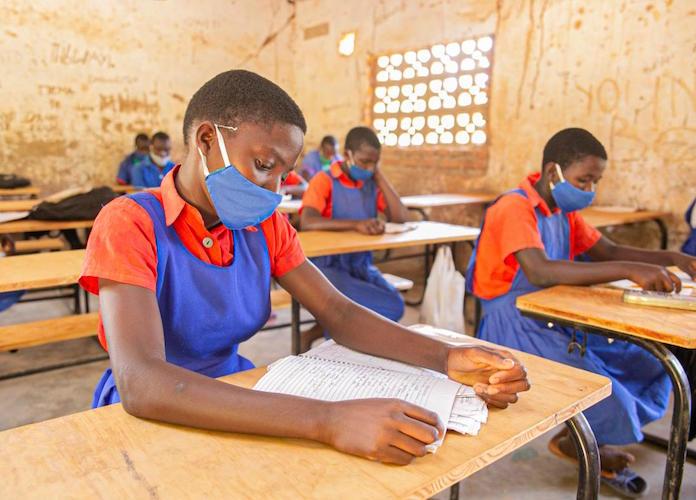
At Luwambaza primary school, students like 15-year-old Caroline (above left) love sitting at desks provided by the K.I.N.D. © UNICEF Malawi/2020/Malumbo Simwaka
Caroline, a 15-year-old student at the school, agrees with her teacher that when they were sitting on the floor, most of her peers would rarely attend school. There was just too much dust in the classrooms, which caused endless breathing issues.
Caroline’s parents immigrated to South Africa, leaving her and her siblings with her grandmother, who is a struggling cassava farmer.
“At the time that I was sitting on the floor at school, my uniform would quickly get dirty long before break time. At home, we had no soap to wash it," explains Caroline, who plans to become a high school teacher when she finishes her studies. "This is why I used to be absent from school until we were able to clean the uniform.”
The desks make it easier for students to maintain physical distancing to prevent the spread of COVID-19
The desks have a new function during the COVID-19 pandemic, the deputy head teacher adds. "They couldn't have come at a better time. It is now easy to observe physical distancing."
Before COVID-19, Munthali says each classroom had 24 desks, but now they have 14 in order to observe the physical distance. "With the desks, it is easy to put learners a meter apart. Before we had the desks, it was difficult to detect those who were misbehaving in the class," says Munthali. "It was too crowded."
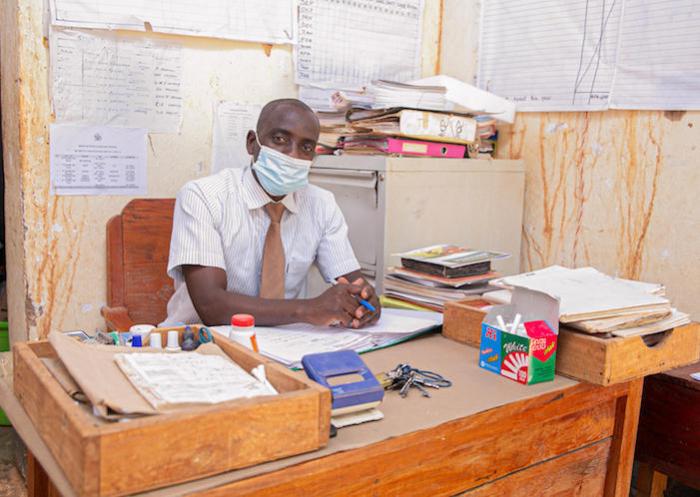
"The desks couldn't have come at a better time," says Steven Hembe Munthali, deputy head teacher at UNICEF-supported Luwambaza Primary Schooli. The desks arrived in November 2019, just months before the start of the COVID-19 pandemic. "With the desks, it is easy to keep the students a meter apart in the classroom." © UNICEF/UNI386389/
“The desks have really made everything easy for us. Learning is far better now as we do not have distractions that we used to experience when we were sitting on the floor,” says Caroline, who learned COVID-19 prevention strategies from her teachers and the radio.
The school was disinfected by health workers before it reopened, and morning assemblies have been cancelled until further notice. Munthali adds that there are handwashing facilities placed in strategic locations on the school premises.
“We held sensitization meetings on how to prevent the spread of the novel coronavirus,” said Munthali. They also learned how to make masks for the community.
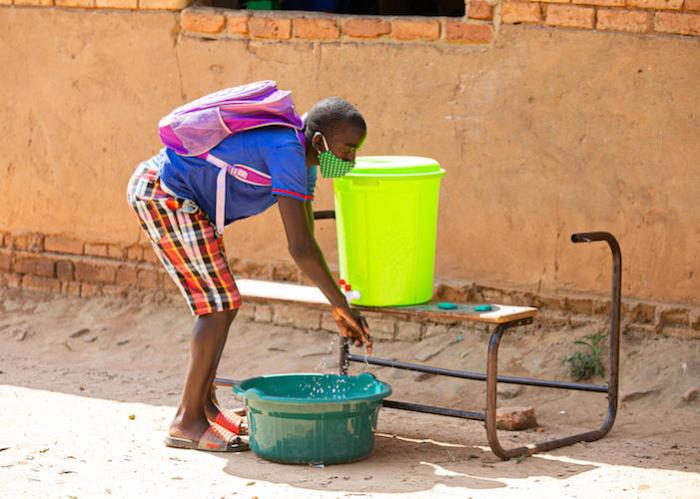
Lovewell, 17, washes hands after attending classes at UNICEF-supported Luwambaza Primary School. © UNICEF/UNI386377
"Learning used to be difficult, says 17-year-old Lovewell, thinking back on the days when the school had only a few rickety desks, enough for less than a quarter of the senior class. "Sometimes the wobbly desks would crack and break. That disrupted lessons and even injured some of the students, who had to miss school as a result."
Lovewell’s parents are subsistence farmers of rice. Getting enough to eat is always a challenge. “When the schools were closed, I missed my studies. I am happy when I am learning, and now that schools have reopened, I am very excited. This means I will fulfil my dream of becoming a pilot,” says Lovewell.
It is evident by these children’s enthusiasm for their studies that UNICEF and the KIND Fund’s goal to empower school children in Malawi by providing school desks to improve learning environments is bearing fruits. To date, the KIND Fund has provided 234,703 desks benefitting more than 938,000 learners, educating and empowering the next generation.
Learn more about how the K.I.N.D. fund is impacting the lives of young people in Malawi here.
Be K.I.N.D. to a Student in Malawi: Donate a desk or scholarship. Funding a year of education provides tuition plus school uniforms and learning supplies.
Top photo: Students take a break outside Luwambaza Primary School in Nkhatabay district, northern Malawi. © UNICEF/UNI386387

